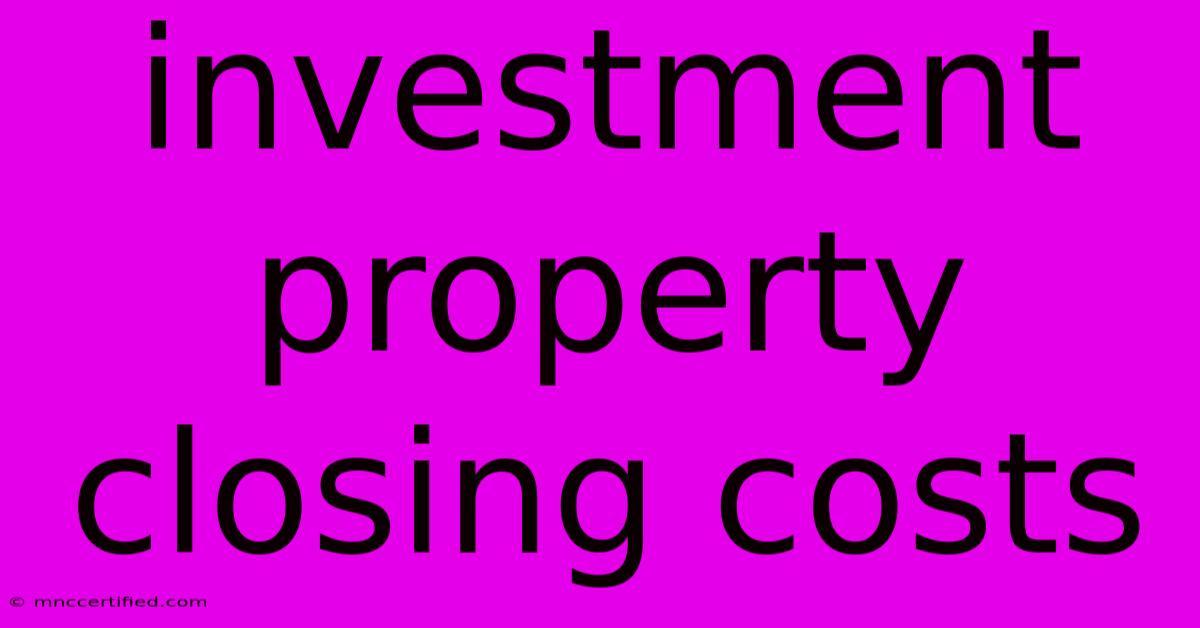Investment Property Closing Costs

Table of Contents
Understanding Investment Property Closing Costs: A Comprehensive Guide
Buying an investment property is a significant financial undertaking. While the down payment often takes center stage, understanding the associated closing costs is crucial for budgeting accurately and avoiding unpleasant surprises. This comprehensive guide will break down the various fees you can expect to encounter during the closing process, helping you navigate this important stage of your investment journey.
What are Closing Costs?
Closing costs are various fees and expenses paid at the time of closing a real estate transaction. Unlike the down payment, which goes towards the purchase price, closing costs cover services and administrative processes involved in finalizing the sale. These costs can vary significantly depending on location, the type of property, and the specific circumstances of the sale. For investment properties, these costs can be higher than for residential purchases due to factors like potential commercial aspects or higher loan amounts.
Key Closing Costs for Investment Properties: A Detailed Breakdown
Here's a breakdown of common closing costs you should anticipate:
Loan-Related Costs:
- Loan Origination Fee: A fee charged by the lender for processing your loan application. This percentage-based fee typically ranges from 0.5% to 1% of the loan amount. Negotiating this fee is often possible.
- Discount Points: These are prepaid interest points that buy down your interest rate. While increasing upfront costs, they can save you money over the life of the loan. Weigh the long-term savings against the immediate expense.
- Appraisal Fee: The cost of a professional appraisal to determine the property's market value. This is essential for lenders to assess the risk.
- Credit Report Fee: The cost of obtaining your credit report, used by the lender to assess your creditworthiness.
- Title Search and Insurance: A title search verifies ownership and identifies any liens or encumbrances on the property. Title insurance protects you against future claims on the title. This is crucial, especially for investment properties, where protecting your investment is paramount.
- Private Mortgage Insurance (PMI): If your down payment is less than 20%, you'll likely need PMI, which protects the lender against default. For investment properties, this is often required regardless of down payment.
Property-Related Costs:
- Recording Fees: Fees paid to the county recorder's office to record the transfer of ownership.
- Transfer Taxes: Taxes levied by the state or local government on the transfer of property ownership. These amounts vary greatly by location.
- Homeowner's Insurance: You'll need to secure homeowner's insurance before closing. This cost will depend on the property's value and risk factors. Consider factors like potential rental income when choosing your policy.
- Property Taxes: Prorated property taxes will be due at closing. This represents the portion of the property taxes the seller owes from the beginning of the tax year to the closing date.
Other Potential Costs:
- Attorney Fees: While not always required, an attorney specializing in real estate can be invaluable, particularly for complex transactions or investment properties.
- Survey Fee: A land survey may be necessary to verify property boundaries, especially if there are any ambiguities or concerns.
- Inspection Fees: Professional inspections (e.g., pest inspection, home inspection) help identify potential problems before purchase. These are highly recommended for investment properties to avoid costly repairs after purchase.
Minimizing Investment Property Closing Costs
While some closing costs are unavoidable, you can take steps to minimize expenses:
- Shop around for lenders: Compare loan rates and fees from multiple lenders to secure the most favorable terms.
- Negotiate closing costs: Some costs are negotiable, such as loan origination fees.
- Consider discount points strategically: Evaluate the long-term impact of buying down your interest rate.
- Use a real estate agent: A skilled agent can negotiate favorable terms and guide you through the process, potentially saving you money in the long run.
Conclusion: Planning for Success
Understanding investment property closing costs is paramount to successful real estate investing. By carefully budgeting for these expenses, comparing lenders, and working with experienced professionals, you can mitigate potential financial surprises and set your investment on a path to profitability. Remember to always factor in a buffer for unexpected costs. Thorough planning ensures a smoother closing process and a more secure investment.

Thank you for visiting our website wich cover about Investment Property Closing Costs. We hope the information provided has been useful to you. Feel free to contact us if you have any questions or need further assistance. See you next time and dont miss to bookmark.
Featured Posts
-
Investment Of The Chain Master 5e
Nov 20, 2024
-
Russian Citizenship By Investment
Nov 20, 2024
-
Travel Insurance For Eu Residents
Nov 20, 2024
-
Cks Prime Investments Collections
Nov 20, 2024
-
Fisher Investments When To Retire
Nov 20, 2024